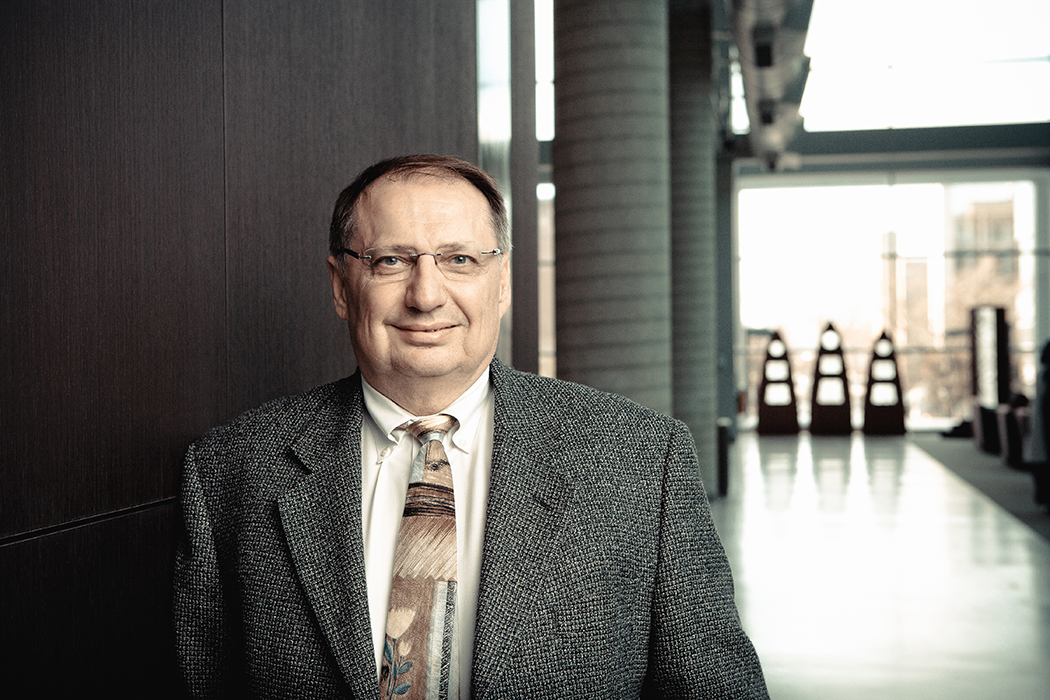
Patients, serving community inspire dean, Faculty of Health Sciences
There is nothing as constant as change, as the old adage has it. Nowhere is that more evident than in today’s ever-evolving world of health care.
Dr. Brian Postl sees change as necessary for delivering effective health care for all Manitobans. As dean of the newly established Faculty of Health Sciences and vice-provost (health sciences), he is spearheading a new approach for students and faculty to become leaders and innovators in their fields.
“I kind of relish change and I think that’s a useful characteristic because there’s no point in leading something if you’re not trying to change it — that’s called management — and leadership is about change,” Postl says.
Stemming from an initiative to improve the academic structure of the U of M, the Faculty of Health Sciences brings together the Colleges of Dentistry, Medicine, Nursing, Pharmacy and Rehabilitation Sciences as an integrated unit that positions the university as an international leader in health education, training, research, practice and community engagement.
“There’s growing evidence that patient care provided in interdisciplinary and multi-professional teams is more effective,” Postl says. “Uniting into a single faculty allows us to really bring together the strengths of all of the colleges, which will enable us to learn from each other and have a stronger presence in the community.”
Early life experiences and interests have helped form Postl’s views on the role of health care in the community.
“I’ve always been very interested in people and how things work. I actually started out in engineering but didn’t find it all that appealing,” he says. “In some ways, medicine is very much about needing to be curious about how things work and problem-solving.”
Working in Churchill as a pediatrician after he graduated from medical school, Postl saw first-hand the issues that many of his patients faced and developed an interest in population and community health.
“Housing, poverty, nutrition and employment all had huge impacts on the kind of patients you were seeing and the problems they had to deal with,” Postl says. “That experience led me into having a strong interest in population and public health, as well as in pediatrics and child care.”
Postl sees social responsibility as a key component of health care education. “There is an implicit social contract to being a health professional, and [an expectation] that we will always do our best to serve patients,” he says. “But the extension of that is that we should serve the community. We have to keep making sure that all students understand the privilege they’re receiving in becoming health professionals.”
Postl seems pleased that the message of social responsibility is being taken to heart, as demonstrated by the participation of over 100 Faculty of Health Sciences faculty members, students and staff in a recent partnership with Habitat for Humanity to build a house for a family in need.
“If we can imbue in our students that their role is about somebody else — it’s about the patient, or a collection of patients, or a community of patients — that’s the ultimate lesson,” Postl says. “If patients didn’t need us, we wouldn’t need these professions and we have to remember that. They [patients] are the inspiration of medicine.”







Thanks for sharing the age old adage. But India is different. The more things appear to change, more they remain the same. Our villages where 70% of our population have their homes still lack thebasic physical and social Infrastructure. They virtually exist in abandoned ” ISOLATION”. WHat is the unification you propose at the micro level within.First we need to make level playing of progress to reap the demographic dividend and progress. Globalization can be the next goal, if you agree. The problem is that we start looking West ward to make that change happen. Not Always true! I admire Manitoba Univ and had the opportunity to discuss with many interns who come to India and have sometimes stayed with me also. Thanks